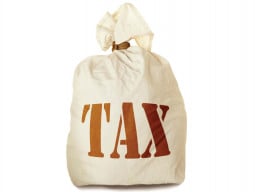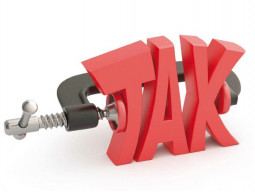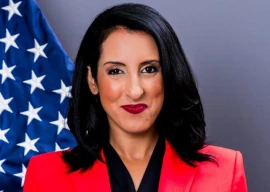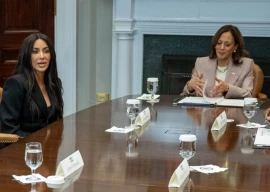
According to the Federal Board of Revenue (FBR), less than 0.5 per cent of Pakistanis pay income tax. That’s just 750,000 individuals out of a population of some 180 million. Tax revenue in Pakistan, as a proportion of GDP is around nine per cent — compared with 14 per cent for countries with similar per capita incomes. Until Pakistan can raise enough money through tax, it will continue to be excessively dependent on loans and foreign aid. Debt to repay loans now stands at $60 billion. This means that over 60 per cent of Pakistan’s federal revenue is spent simply on paying back interest and debt every year, instead of being spent on vital services, such as education, health and infrastructure.
That’s bad housekeeping. It’s bad for the ordinary men and women of Pakistan. It’s bad for Pakistan’s international friends, who want to trade, not give aid and whose taxpayers should not have to subsidise those in Pakistan who should pay tax but don’t. The problem starts at the top. By paying their fair share of taxes and backing tax reform, businesses, wealthy individuals and elected politicians in Pakistan can lead by example. These people should be paving the way, helping to close tax loopholes and encourage others to pay what they owe. Sadly, for now anyway, not all these people are the role models they should be.
The Pakistan government recognises that it has one of the lowest tax collection rates in the world. The PML-N manifesto set out the commitment to increase tax as a proportion of GDP to 15 per cent. Independent analysis shows this commitment is achievable. Better still, the government has given the FBR a clear mandate to increase tax collections by enforcing existing tax laws and bringing more people into the tax net who are, at best, creatively interpreting the rules or, at worst, cheating the system. According to Pakistan’s finance minister, in the past 11 months, the FBR has witnessed a tax receipt of nearly 18 per cent. This increase is a testament to the hard work of the finance minister and his colleagues. Any increase in tax receipts is to be welcomed. But the gains are still lower than needed. Not enough tax is raised to fully finance improvements in the quality of life for poor people. Surely, it can’t be good for Pakistan that the elite can afford luxury cars and foreign trips but can’t afford to pay their taxes?
The government is also looking to remove exemptions, simplify the tax collection system and drive out corruption. The other side of the deal, however, is that if more people are paying their taxes, it is essential that these people can see that their money is being spent effectively on public services and securing value for money. Many people in Pakistan, who live below the poverty line, benefit from aid programmes from international partners in areas such as education, health and governance. The UK plans to increase bilateral aid to Pakistan in 2014-15, making Pakistan the largest recipient of UK aid. But we can’t expect people in the UK to pay taxes to improve education and health in Pakistan if Pakistan’s wealthiest do not pay meaningful amounts of income tax. This is not about raising taxes on everyone. This is about asking people to pay their fair share and what the law requires them to.
In any case, foreign aid is not a long-term solution. As a friend of Pakistan, the UK wants it to be on a healthy growth trajectory, competing on the global stage. We fully support Pakistan’s efforts, alongside the World Bank and others, to achieve its tax-to-GDP target of 15 per cent. The UK is supporting Pakistan at both federal and provincial levels in the implementation of the recently agreed IMF programme, including in the area of raising tax revenues. The UK’s equivalent of FBR, HM Revenue and Customs department stands ready to share its experience of revenue-raising. We continue to champion the importance of more people paying their tax, more direct taxation and better enforcement against those who don’t pay what they should. Pakistan has in its hands its own economic health and economic sovereignty. Tax avoidance and poor tax enforcement is cheating Pakistan’s future.
Published in The Express Tribune, December 14th, 2013.
Like Opinion & Editorial on Facebook, follow @ETOpEd on Twitter to receive all updates on all our daily pieces.
COMMENTS (18)
Comments are moderated and generally will be posted if they are on-topic and not abusive.
For more information, please see our Comments FAQ





























1714024018-0/ModiLara-(1)1714024018-0-270x192.webp)









I know a retired naval captain who brought a house in Canada for over 500,000 Canadian dollars cash. Now where did he get the money from I ask.
As a result of the above article I read a profile on how people become wealthy, and when I say wealthy I do not mean super wealthy. Just your relatively comfortable person with a few million Rs. As a general rule they do not appear wealthy and do not live the high life which company executives on expense accounts tend to do. They tend to live in ordinary houses like everybody else, do not spend profligately, and slowly but surely build up their wealth with careful investment and sacrifice. The capital is only spent when children inherit. It is not easy to get taxes out of the original small investor. The simple way is to gradually increase the percentage of Value Added Tax using the tiptoe effect. Unfortunately, it hits the poor, but also the wealthy. The only alternative, that I can see, is for the Government to cut military spending, currently running at 627 billion rupees, plus other hidden costs such as nuclear weapon development, and we know they will not do that. The new Government recently introduces a 10 % increase in defense spending in spite of a crippling budget deficit, which means more borrowings and interest to be paid. Best of luck to the Pakistan people. They will need it.
@Nitpicker: Thanks, first subject taught in tax class is difference between avoidance and evasion. Majority of Pakistani rich are corrupt government officials, politicians, landlords, drug and arms smugglers, black market mafia, Qabza groups, terrorists and kidnappers. Sending tax notice to them is a fool's adventure. Genuine industrialists and businessmen are few. If you target genuine tax payers to balance your books, you make a big mistake. Think again.
Dear Mr Thompson . I am a British national of Pakistani origin and having roots in Pakistan I fully understand and agree with you. . Pakistan also needs British (and western) support in putting stop to this cheating. The UK government has introduced Entrepreneur visa where people can apply for that visa for showing £200,000 and for some in country applications it is £50,000. According to my observation and great deal of anecdotal evidence, there are people who are showing big GENUINE statements from Pakistan but the person named on the statement has not paid any tax in either Pakistan or the UK. According to my guess, the applications (both within the UK and from Pakistan) are in thousands that involve Pakistani bank statments/assets! . Would you please ask British government to contact Pakistan revenue department and give them details of these statements to see if they pay any taxes and see if these people have paid any taxes in the UK? It will help Pakistan to get those people out of poverty who are struggling with 50 rupees a day. It will also help the British government to not get people who are into money laundering and fraud!
What Mr Thompson seems to forget is the basic flaw here, that one simply can not help those who don't want to help themselves ! Its not a case that UK is rolling in funds, as there are enough cutbacks on our own public sector to the tune of billions at present, and one really wonders as to why should UK Taxpayers be funding this lot of thieves and beggars, who are Nuclear power, but can not even provide basic electricity 24/7 to its people ? Its rather shocking as to what their Army takes of the budget in name of security ! This Nation has never made any attempt to modernise or create any economic growth since its inception, as its basic policy is to live off Aid and Loans since Its inception ! As a UK Taxpayer, I too would like the choice as to how my taxes are spent ! Its certainly not on these lot, but rather on NHS, Education and Social Services at home.
Nice advice by a friend of Pak
The column would have become more comprehensive, if land reforms were also made part of it Land Reforms Bill has been put together by MQM, awaiting it to be tabled apparently the legislators are not very keen to debate over it for some obvious reasons
Though yes, it is cheating. But it also goes to show people believe in government, and how much they are going to utilize the tax.
kudos to Mr Thomson.
Thanks for drumming in what should be our politicians job...we strongly feel that if the Govt. is really serious in raising the tax to GDP ratio as it is reiterating everyday and is imperative too, there should be a rigorous media campaign which highlights all the top politicians, members of the judiciary, the army top brass,bureaucrats, media icons leading by example ...as the worthy High Commissioner has pointed out . This is an arena where the Govt needs to focus on top priority. When ordinary Pakistanis see the 'bigwigs' setting an example, they'll surely follow suit!
Mr Thomson's article sounds good if you read it quickly. Obviously people should pay their fair share of taxes, but there are a couple of problems that get in the way. First off, governments of all persuasions rarely spend tax money wisely. I have moved around the 5 eye countries mainly, and it has been my experience that governments have basically two priorities. With increased income they spend even larger sums of money on the military, and keep advising their people that they are now more secure. Secondly, they spend outrageous sums of money on themselves in all kinds of ways. Constant salary increases, large pensions, lavish overseas trips, banquets. When I say government I do not mean just the elected representatives. It is amazing how many thousands of highly paid government workers receive even larger remuneration than the elected representatives, and these include diplomatic staff and High Commissioners. Then you have to determine where the tax will come from? Basically, we are talking about the middle class. It is almost impossible to get money out of the wealthy. They have highly paid tax advisers and/or lawyers working out how to avoid tax. The poor on RS50 per day cannot afford to pay tax, so the whole burden falls on the middle-class. Unfortunately, only 7.33% live on more than US$4.00 per day, and on average have a family size of 4 to 5 who live on US$2.00 per day. The only ones left are the so called wealthy and there are not many of them. I think the Pakistan Tax Department will have a headache increasing taxes. Mr Thomson needs to do his homework.
If I don't feel Pakistani then why should I pay taxes to my oppressor ?
We do pay tax. It's called "inflation". Asking any more of us is ludicrous. Given the state of government services in this country why would anyone pay taxes? It will all go to waste anyway.
The solution to Pakistan's problems lie in reducing the size of the government in line with tax revenues.
I can not agree more than what has been mentioned. It is imperative for the state to follow the principles of good governance by exceeding their targets. The IMF guidelines should be taken in a constructive manner to achieve the desired results. However, I find it extremely difficult to understand that what moral platform the policy makers have to demand tax when their own house is out of order. Unless, we create an environment to discourage the glorification of corruption and offer incentives to the honest citizens of pakistan, it would be challenging to set the teack. Mr Thompson, I thank you for your sincere concerns and recommendations for PAKISTAN as an expat.
Very well writter SIR, hopefully someday, my countrymen will realize what we are letting ourselves into. We expect health, education and services parallel to 911 but arent ready to pay tax. :(
I agree with this.